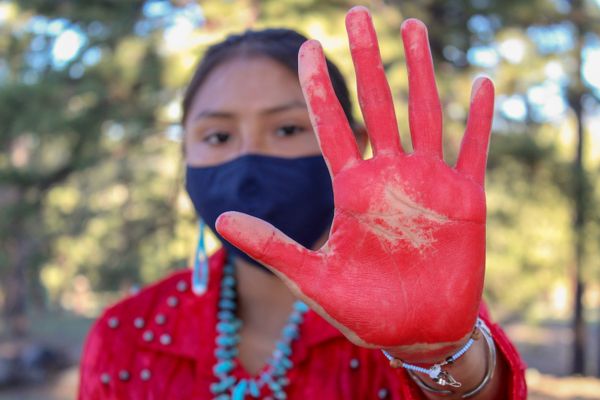
- Details
- By Native News Online Staff
The Center for Native American Youth (CNAY) last week announced the 2024 cohort of the Remembering Our Sisters Fellowship, which supports individuals with a demonstrated commitment to raising awareness about the Missing and Murdered Indigenous Women, Girls, and Two-Spirit (MMIWG2S+) epidemic.
The 2024 Remembering Our Sisters Fellows are Sage Chief (Oglala Lakota and Diné); McKaylin Peters (Menominee Nation); Linaly Miyamoto (Coast Salish Cowichan); MarLynn Cloud (Apsáalooke Nation); Christina Kaltsukis, (Yakama); and Summer Wildbill from the Confederated Tribes of the Umatilla Indian Reservation.
Throughout the Fellowship, participants will receive stipends, technical assistance, mentorship, peer-to-peer learning opportunities, and a platform to share their projects. Throughout six months, fellows will create digital art and digital storytelling projects that bring attention and awareness to this critical issue.
"We are honored to welcome the 2024 Remembering Our Sisters Fellows into our CNAY family," Cheyenne Brady, Associate Director of Youth Programs, said in a press release. "By uplifting their voices through the arts, these young leaders are fueling the powerful and relentless movement that is working to protect our Indigenous sisters, daughters, and relatives."
The Fellowship kicked off with the 2024 Remember Our Sisters Week, where the new cohort came together virtually to discuss their goals, learn from one another, and hear from influential women working to address the MMIWG2S+ epidemic.
Speakers included former North Dakota State Representative Ruth Buffalo (Mandan Hidatsa Arikara Nation), Executive Producer of the short film "Not Afraid" Jen Murphey (Chippewa Cree Tribes), ReeCreeations owner Agnes Woodward-Yellowbear (Kawacatoose First Nation), 3rd year PhD Candidate Jamie Yellowtail (Apsáalooke), and award-winning investigative journalist Connie Walker (Cree).
More Stories Like This
Santa Ynez Chumash Donate Original Artwork to Buellton LibraryZuni Youth Enrichment Project Art Apprentices Exhibit Work During Santa Fe Indian Market Weekend
New Book Sheds Light on Nome, Alaska—Centering Indigenous Voices and Untold Histories
Hannah Wolfe Wins First Place in Her Division at the 2025 Red Earth Youth Art Contest
103rd Annual Santa Fe Indian Market Best of Show Winners
Help us tell the stories that could save Native languages and food traditions
At a critical moment for Indian Country, Native News Online is embarking on our most ambitious reporting project yet: "Cultivating Culture," a three-year investigation into two forces shaping Native community survival—food sovereignty and language revitalization.
The devastating impact of COVID-19 accelerated the loss of Native elders and with them, irreplaceable cultural knowledge. Yet across tribal communities, innovative leaders are fighting back, reclaiming traditional food systems and breathing new life into Native languages. These aren't just cultural preservation efforts—they're powerful pathways to community health, healing, and resilience.
Our dedicated reporting team will spend three years documenting these stories through on-the-ground reporting in 18 tribal communities, producing over 200 in-depth stories, 18 podcast episodes, and multimedia content that amplifies Indigenous voices. We'll show policymakers, funders, and allies how cultural restoration directly impacts physical and mental wellness while celebrating successful models of sovereignty and self-determination.
This isn't corporate media parachuting into Indian Country for a quick story. This is sustained, relationship-based journalism by Native reporters who understand these communities. It's "Warrior Journalism"—fearless reporting that serves the 5.5 million readers who depend on us for news that mainstream media often ignores.
We need your help right now. While we've secured partial funding, we're still $450,000 short of our three-year budget. Our immediate goal is $25,000 this month to keep this critical work moving forward—funding reporter salaries, travel to remote communities, photography, and the deep reporting these stories deserve.
Every dollar directly supports Indigenous journalists telling Indigenous stories. Whether it's $5 or $50, your contribution ensures these vital narratives of resilience, innovation, and hope don't disappear into silence.
 The stakes couldn't be higher. Native languages are being lost at an alarming rate. Food insecurity plagues many tribal communities. But solutions are emerging, and these stories need to be told.
The stakes couldn't be higher. Native languages are being lost at an alarming rate. Food insecurity plagues many tribal communities. But solutions are emerging, and these stories need to be told.
Support independent Native journalism. Fund the stories that matter.
Levi Rickert (Potawatomi), Editor & Publisher

